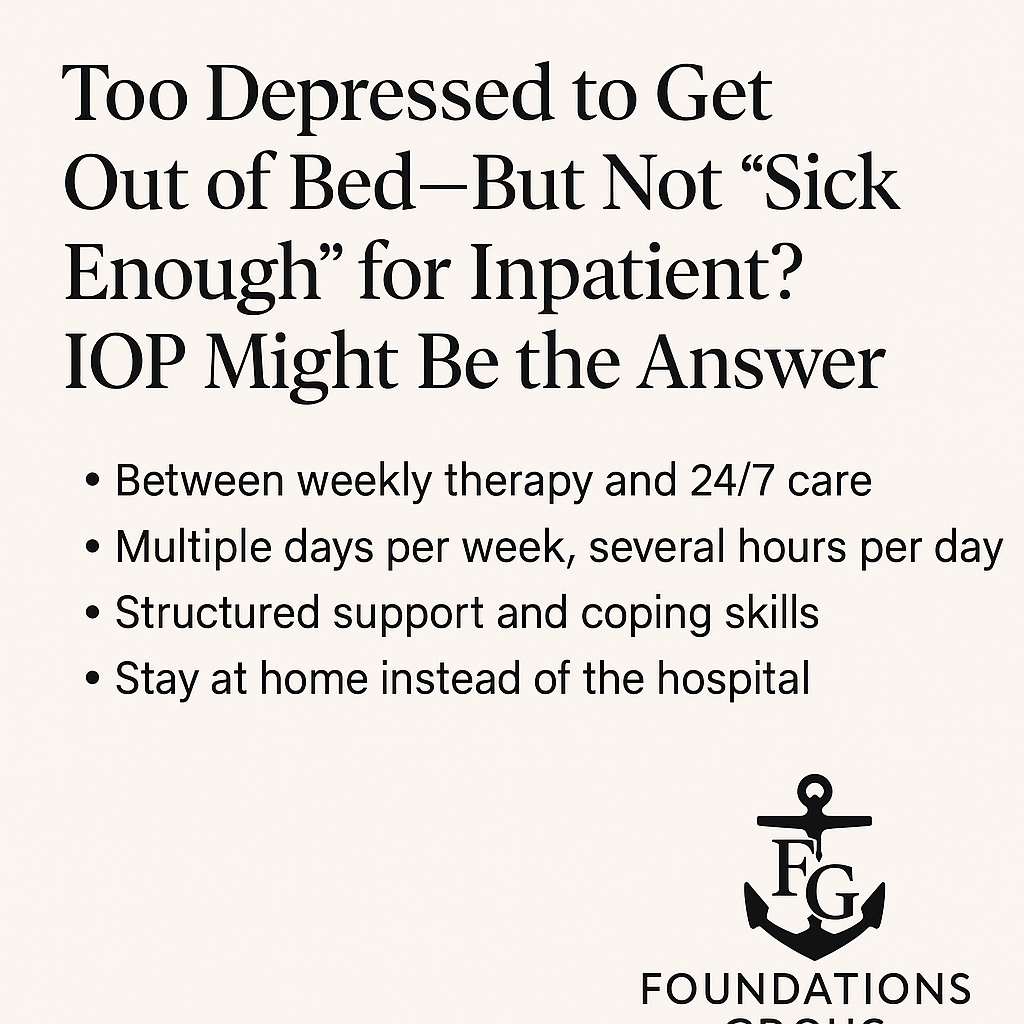Some mornings, the weight is so heavy it pins you to the bed. You’re not just tired—you’re depleted. Emotionally wrung out. Unreachable by a text, overwhelmed by the thought of taking a shower.
And yet… you’re still “functional” enough to go unseen. You haven’t ended up in the ER. You don’t meet the criteria for inpatient hospitalization. But traditional weekly therapy sessions? They feel like bringing a teacup to a flood.
If this is you, there’s a level of care that was made for this exact in-between place: the intensive outpatient program, or IOP.
When You’re Struggling but Still Expected to Hold It Together
Maybe you’ve been in therapy for a while—but lately, it feels like even that can’t reach you.
Maybe you’ve tried to “rest” your way back to baseline, only to find that sleep doesn’t help when it’s depression that’s weighing you down.
Or maybe people keep telling you you’re “strong” because you’re still getting to work or caring for your kids—but you’re unraveling in private.
What often gets missed is that you can feel completely hollowed out and still pass as fine.
You can be clinically depressed—struggling to maintain even the most basic routines—and still be told you’re “not sick enough” for inpatient care.
This isn’t a failure on your part. It’s a flaw in the system.
Most people think of mental health treatment as either once-a-week therapy or 24/7 hospitalization. But in reality, there are levels of care in between—and those middle levels are often where real healing starts.
What Is an Intensive Outpatient Program (IOP)?
An intensive outpatient program offers structured treatment while allowing you to live at home. Typically, IOP involves:
- 3 to 5 days per week of care
- Morning or afternoon sessions lasting 3+ hours
- Group therapy, individual sessions, and skills-building
- Access to psychiatric care if needed
- A small peer community for shared support
At Foundations Group Behavioral Health, our IOP is designed for people exactly like you: not in acute crisis, but no longer able to keep pretending everything’s okay.
It’s a place to be honest about how hard things are—without needing to collapse completely to get help.
IOP Isn’t a Step Back—It’s a Step Up in Support
One of the biggest barriers to accessing IOP is internal: that voice that whispers, “You should be able to handle this on your own.”
But here’s the truth:
Needing more help doesn’t mean you’ve failed.
It means your current supports aren’t matching the severity of what you’re carrying.
IOP isn’t a punishment. It’s a lifeline for the in-between—the space where things aren’t catastrophic, but they’re also not sustainable.
And more importantly: it’s proactive care. You don’t have to wait until you’re in full crisis to qualify.
What Happens During IOP?
A typical day in IOP is structured, supportive, and varied. Here’s what it might include:
- Check-in group: Where everyone shares how they’re arriving mentally and emotionally
- Skills group or psychoeducation: Learn about emotional regulation, boundaries, depression, anxiety, or trauma responses
- Processing group: A safe space to go deeper, with facilitation from trained therapists
- One-on-one therapy: Sessions with a clinician who knows your full story—not just the highlight reel
- Medication support: If you’re exploring medication, IOP includes access to psychiatric care
You’re not expected to be “on” or have all the answers. You just have to show up. The structure, the support, and the pacing—it’s all designed to meet you exactly where you are.
Why Weekly Therapy Isn’t Always Enough
Weekly therapy can be powerful—but for people experiencing moderate to severe depression, it’s often not enough.
One hour a week simply doesn’t create the momentum needed to disrupt the spiral.
IOP gives you:
- Repetition and reinforcement of new skills
- Multiple check-ins per week so you’re not alone between sessions
- Community care that fights isolation
- A safety net if you start to slip
You’re not just talking about your feelings once a week. You’re building a daily rhythm of healing, connection, and accountability.

Who Is IOP For?
If you’re wondering whether you “qualify” for IOP, here’s a better question:
Are you feeling too overwhelmed to get through the week, but not in immediate crisis?
If yes—IOP was likely designed for you.
Here are some signs you might benefit from intensive outpatient care:
- You’ve stopped going to work or school due to mental health
- You’ve lost interest in everything that used to matter to you
- You’re isolating more and more—but don’t want to be alone
- You feel emotionally flooded or emotionally numb most of the time
- Your weekly therapist is concerned—or you’ve stopped going entirely
You don’t need to be at rock bottom. You just need support that matches your actual experience.
A New Way Forward—Without Starting Over
Starting IOP doesn’t mean giving up your current providers or losing your progress.
In fact, many clients keep their outside therapists and coordinate care.
At Foundations, we believe in building care around you—not the other way around.
That means working at your pace, personalizing your treatment, and creating a plan that helps you stabilize now while setting you up for long-term growth.
FAQ: Intensive Outpatient Program (IOP)
Is IOP the same as inpatient or residential treatment?
No. IOP allows you to live at home and attend structured treatment during the day. It’s less intensive than inpatient, but more supportive than standard outpatient therapy.
How long does IOP last?
Programs typically last 6–8 weeks, but this varies based on your needs. We work with you to determine the right timeline and transition plan.
Can I work or go to school while in IOP?
Many clients do. IOP schedules are often flexible, with half-day morning or afternoon options to accommodate life outside of treatment.
Is IOP covered by insurance?
Yes, most major insurance plans cover IOP. Our team can help verify your benefits and walk you through the financial side.
Do I have to take medication in IOP?
No. Medication management is available, but never required. You’ll work with your clinical team to decide what feels right for you.
You Deserve Help That Meets You Where You Are
If you’re stuck in a pattern of barely hanging on—but not feeling “bad enough” to ask for more—IOP might be exactly what’s missing.
You’re not lazy. You’re not dramatic. You’re not failing.
You’re living with depression that needs real support—not just survival mode.
📞 Let’s take the next step together. Call us at (888) 685-9730. Our intensive outpatient program in Massachusetts is ready when you are.








